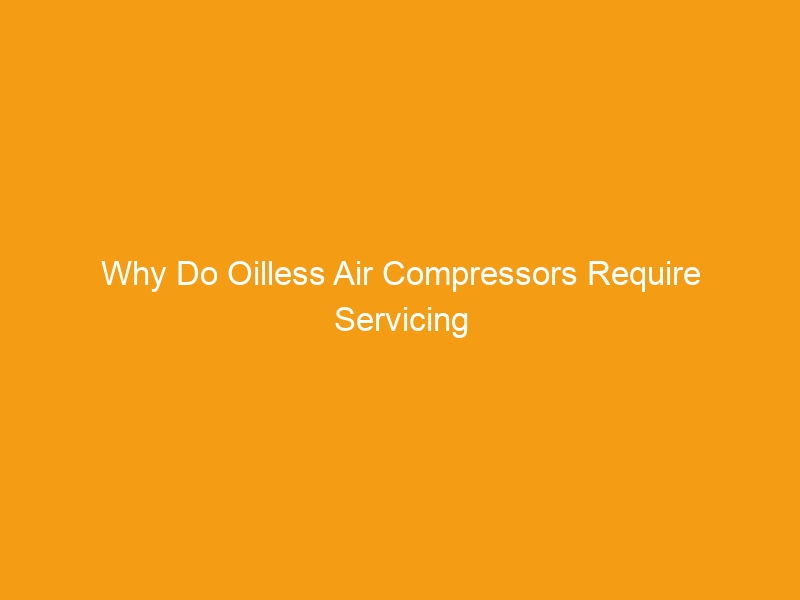Several manufacturing processes rely on air pressure, and under the wrong conditions, compressed air leaks may be financially devastating. Oilless air compressors have to work harder to generate the same quantity of compressed air when there are leaks, which leads to raised energy costs and system operation disruption.
Suppose you agree with the words of Benjamin Franklin, “An ounce of prevention is worth a pound of cure”. In that case, you couldn’t agree more than an effective way of preventing air leaks and reducing costs is by servicing your oil-free air compressor regularly.
Need more convincing on why your oilless air compressor needs servicing checks? Read further.
What are Oilless Air Compressors?
An oilless air compressor is one of two specific types of rotary screw and piston air compressors, the other type being an oiled air compressor.
This machine is a pneumatic device that transforms power into potential energy stored in pressurized air (i.e., compressed air). The air compressor increases the pressure of a storage tank by forcing more and more air into it using one of many techniques. This pressure buildup continues until the tank reaches its engineered top limit. The compressed air is then stored in the tank until it is needed.
What are Applications of Oilless Air Compressors?
Oil-free air compressors are utilized in various sectors where air quality is critical to the final product’s manufacturing process. Such industries include
- Food and beverage processing
- Pharmaceutical manufacturing and packaging
- Wastewater treatment
- Chemical and Petrochemical processing
- Semiconductor and Electronics Manufacturing
- Medical sector
- Automotive paint spraying
- Textile manufacturing
Because even small amounts of oil may cause costly production downtime and product deterioration, the use of clean air compressors has become an industry standard.
Why service your oil-free air compressor?
Servicing your oil-free air compressor may seem like a setback in costs; however, your business has a lot of rewards to reap in the long term. Some reasons to service your device include
To detect air leaks.
One popular misconception is that compressed-air leaks and maintenance are unimportant. Air leaks account for a significant portion of the energy lost by air compressors which can cause up to 30% of an air compressor’s output to be wasted.
Air leaks from oilless air compressors are typical in all industrial applications, and they can be expensive and hard to find. You can discover some air leaks simply by stepping near your air compressor system and listening. However, this isn’t always the best solution, especially if you work in a noisy factory, plant, or body shop.
Servicing personnel can utilize ultrasonic leak detection devices or other technology to locate these hidden leaks; although this is quite expensive in the long run, it will be cost-effective.
Servicing your compressor can help you detect air leaks early and save your business a lot of money.
To save energy costs.
In today’s world of energy wastage and climate change, your business should look to conserving energy or leaving a reduced carbon impact. There will always be some energy waste when utilizing compressed air, but not keeping up with servicing can make this waste much worse. This energy waste will lead to an overall increase in costs and can affect total production.
Enhance employee safety
When your employees work with faulty equipment, their safety is jeopardized, and it will cost your company money to get things back in order.
The use of air compressor servicing indicates that the firm places a high value on onsite worker safety.
Oilless air compressor servicing eliminates the risk of injury and guarantees that the equipment is ready for work.
How can you prevent air leaks?
Many firms, corporations, and organizations utilize preventive maintenance to plan certain maintenance activities that ensure assets, machinery, and other equipment stay in excellent operating order.
To prevent air leaks, your business should
Draft Out a good servicing plan
Developing a servicing plan will set your preventive maintenance on the right track. You should include the following elements in your solid servicing plan
- Maintenance work is scheduled at a specific time and day.
- A well-managed repair or service work with clearly defined health and safety protocols.
- Employment of a professional engineer that evaluates your machine in its entirety.
- Preventative procedures to keep your equipment working smoothly and following its performance standards.
- Identifying, obtaining, and delivering necessary servicing or replacement components promptly.
- Budgets for maintenance and associated expenditures are well defined.
- Planning for the availability of required resources
Choose a reliable examination provider for air leak detection.
When your air compressor system isn’t well-maintained, it leaks more frequently, wasting energy and contaminating your workspace. Fortunately, you may rectify the problem by obtaining a professional air leak detection inspection.
The servicing personnel will tag leaks, track, verify and assess your clean air compressor.
Make use of a detector.
Using an air detector during working hours is effective, and it can readily access all components of your equipment, thus finding air leaks much more effortlessly. Air compressor service specialists are your best choice; however, even in-house workers can do the job.
Conclusion
If you don’t see any air leaks, it doesn’t imply there aren’t any; nevertheless, if you notice any, have them fixed by an expert to avoid wasting money. Most current air leak service companies provide adaptable and customizable solutions to meet your company’s needs.

